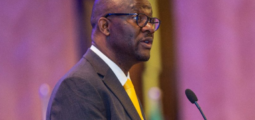The Week That Was… 39
Wim Romeijn looks at the financial talking and turning points of the world over the past seven days.
Carbon Emission Costs and Damages
Pricing carbon emissions is not for the faint of heart, as a working paper released by the National Bureau of Economic Research shows.

The non-partisan collective of over 1,700 economists — among them 43 Nobel laureates — is based in Cambridge, Massachusetts, and churns out over 1,200 papers each year.
This one is catchily entitled Quantifying Climate Change Loss and Damage Consistent with a Social Cost of Greenhouse Gases. Its four authors set out to devise a tool to compute responsibilities and link the social costs of carbon to loss and damage over longer time spans. Instead of using annual emissions as a baseline, the economists use the carbon “stock” — the total up there in the atmosphere — to calculate how much damage is caused by its growth.
The premise is that most carbon, once emitted, lingers for centuries. A lump of coal burned 200 years ago in, say, Bengal, causes the same amount of damage as one burned a century later — or, indeed, yesterday — in Glasgow or Pittsburgh. China, the world’s largest emitter, has historically contributed only half as much carbon stock as the US.
In a thought experiment, the paper’s authors include the impact of a unit of carbon over time. A tonne released in 1990 would have caused only about $4 in damage during its first decade. But as time progresses, the harms and environmental impacts increase.
The working paper contains some eye-popping numbers. A transcontinental flight taken in the US today would have caused $5,500 (£4,470) in damage by 2100. That keeps growing for at least two centuries, easily reaching into the millions. Tabulating country-specific emissions and their damage over time would present America with a $100tn (£81tn) bill by the end of the century. China would owe the world not much less.
Steady as She Goes: Fed Holds the Line
The US Federal Reserve has held its benchmark fund rates between 5.25 and 5.5 percent.
After a two-day meeting, the central bank’s Open Market Committee said it remained “highly attentive to inflation risks”, with the economy expanding at a “solid pace” and a strong job market.
The Fed delivered more good news with projections indicating stronger-than-expected growth for the year and a benign inflation outlook. In its so-called “dot plot”, an exercise in futurology, the bank suggested a fund rate rise of 5.5 to 5.75 percent, pointing to just a quarter-point hike. Few rate cuts are pencilled in for 2024 and 2025, implying a gradual softening of monetary policy.
Fed chair Jerome Powell said the pause in hikes didn’t mean that the bank considered its policy sufficiently restrictive to check inflation. Analysts were surprised by Powell’s moderately hawkish attitude, but concluded that the Fed is simply not ready to declare victory over inflation.
While volatile energy prices are kept out of core calculations, their steady increase may yet undermine the Fed’s crusade against the erosion of purchasing power. Powell acknowledged as much, calling higher energy prices a “significant thing” that over time could affect consumer spending.
Oil prices have crept up because of production cuts by Saudi Arabia and Russia, maintenance work at four California refineries, strong demand from China, and the steady drain on the US Strategic Petroleum Reserve. The Biden Administration had tapped the reserve to push down prices at the pump — but failed to replenish it due to the high price of oil. The US benchmark for crude, West Texas Intermediate, has jumped by 30 percent to reach over $91 a barrel, the highest since November 2022.
Sunak Angers Carmakers
UK car manufacturers are upset with Prime Minister Rishi Sunak’s reversal of some critical climate-change targets.
Those goals included a 2030 ban on the sale of new petrol and diesel vehicles: that was pushed back by five years. The PM also tinkered with the rules on the phase-out of new domestic gas boilers, introducing a series of exemptions for less well-off households — which may now never switch at all.
Labour, enjoying a surge in the polls, immediately said that it would reverse Sunak’s decision should it regain power. Former prime minister Boris Johnson also weighed in, saying that businesses needed certainty, and that Sunak lacked ambition.
Ford UK chair Lisa Brankin was unhappy with Sunak’s announcement. “We need ambition, commitment, and consistency from the government,” she said. “A relaxation of 2030 would undermine all three.” Industrial trade body Make UK added that the watering-down of net-zero targets represented a setback for manufacturers, who need “stability and confidence” to invest.
Japanese carmakers with assembly plants in the UK appear more sanguine. Toyota, heavily invested in hybrid technology, welcomed the recognition that “all affordable low-emission technologies” have a role to play in a pragmatic transition process.
Sunak said the UK remains on-track to reach net zero by 2050. Observers suspect that he may aim to portray Labour leader Keith Starmer as an eco-zealot cruelly imposing a green agenda on struggling families.
Grain Dispute Stalks EC
Just when the European Commission thought that Poland had nestled back into the EU fold, Warsaw sprang a nasty surprise: it would no longer supply arms to Ukraine.
The announcement followed a trade spat that escalated when Kyiv, perhaps unwisely, filed lawsuits at the World Trade Organisation (WTO) against Poland, Hungary and Slovakia after they banned Ukrainian wheat imports. The bans violate EU trade rules.
The commission is in a bind: it must determine which side to back. Ukraine is fighting for survival, and supported by the bloc. In a written note, the EC told Poland, Hungary, and Slovakia that “as a matter of EU law” it would act in the WTO proceedings and co-ordinate legal rebuttals.
The commission also warned that individual member states are not allowed to take unilateral measures on trade. It has promised to assess the complex situation.
By week’s end, the EU had lifted its own temporary embargo on grain from Ukraine. It deemed that supplies would not negatively affect farmers in the five member states bordering the war-torn country. A bilateral deal was put in place to ensure that remained the case.
Ever combative, Ukrainian president Volodymyr Zelensky said in a speech at the UN General Assembly that some of his country’s European friends “play out solidarity in a political theatre”. The message seemed to be directed at Poland — which promptly summoned the Ukrainian ambassador in Warsaw.
Poland has been a staunch ally in Ukraine’s fight. Its response to the WTO lawsuit is described in Brussels as “over the top”, and unhelpful to EU cohesion in the support of Ukraine. The Slovak government hurriedly lifted its ban, while Ukrainian agriculture minister Mykola Solskyi said that the Polish government had agreed to find a mutually acceptable solution.
Media Mogul Steps Down
In a real-life replay of the HBO series Succession, 92-year-old Rupert Murdoch has at long last announced that he is stepping down as chair of Fox Corp (mass media) and News Corp (print media).
In November, he will hand the reins of both companies to his son and heir presumptive Lachlan, 52. The move concludes a psychodrama that has spanned three decades. No change in the Fox News tone of reporting and commenting is expected. Lachlan has been chair and CEO of Fox Corporation since 2019.
Murdoch-watchers (yes, it’s a job) doubt that the nonagenarian will slip quietly into retirement — and may well continue his meddling. The notorious micromanager told his staff that he would remain as chair emeritus and “be involved every day in the contest of ideas”.
As he prepared to relinquish control, the billionaire press baron fired a salvo at his critics. “Elites have open contempt for those who are not members of their rarefied class,” he said. “Most of the media (are) in cahoots with those elites, peddling political narratives, rather than pursuing the truth.”
Earlier this year, Murdoch disbursed $785m (£738m) to settle a lawsuit brought by US voting-machine manufacturer Dominion. Fox News had reported that the devices had been reprogrammed to rig the 2020 election outcome and deny Donald Trump victory. Fox Corp still faces a $2.7bn (£2.5bn) damages claim from Smartmatic, another voting machine manufacturer that was accused of tampering.
Murdoch is reported to have paid Prince William, heir to the British throne, a “very large sum of money” in 2020 to settle a phone-hacking claim. News Corp is also being sued by Prince Harry in a case before a London High Court.
The change of guard at the Murdoch Empire comes after a chaotic year. Fox News viewership fell by more than half after the dismissal of its revered Right-wing anchor, Tucker Carlson.
The network irked the Trump fanbase after it moved away from blind support for the former president. A recent poll found that Americans don’t trust Fox News, the self-proclaimed “most trusted news network” in the nation. It placed far below CNN, and even One America News, a far-Right pro-Trump network.
You may have an interest in also reading…
World Bank Report: Digital Payments Vital To Economic Growth
Gates Foundation and Better Than Cash Alliance urge governments to embrace digital financial services, offers concrete action steps. Integrating digital
Sustainable Stock Exchanges: Urgent Need for Simple Metrics
The 4th biennial Global Dialogue on the Sustainable Stock Exchanges (SSE) Initiative, concluded yesterday (10/14) at the United Nations Geneva
Global FDI Recovery Stalls in 2012
Macroeconomic fragility and policy uncertainty for investors has led to an 18 per cent decline in global foreign direct investment

















































































